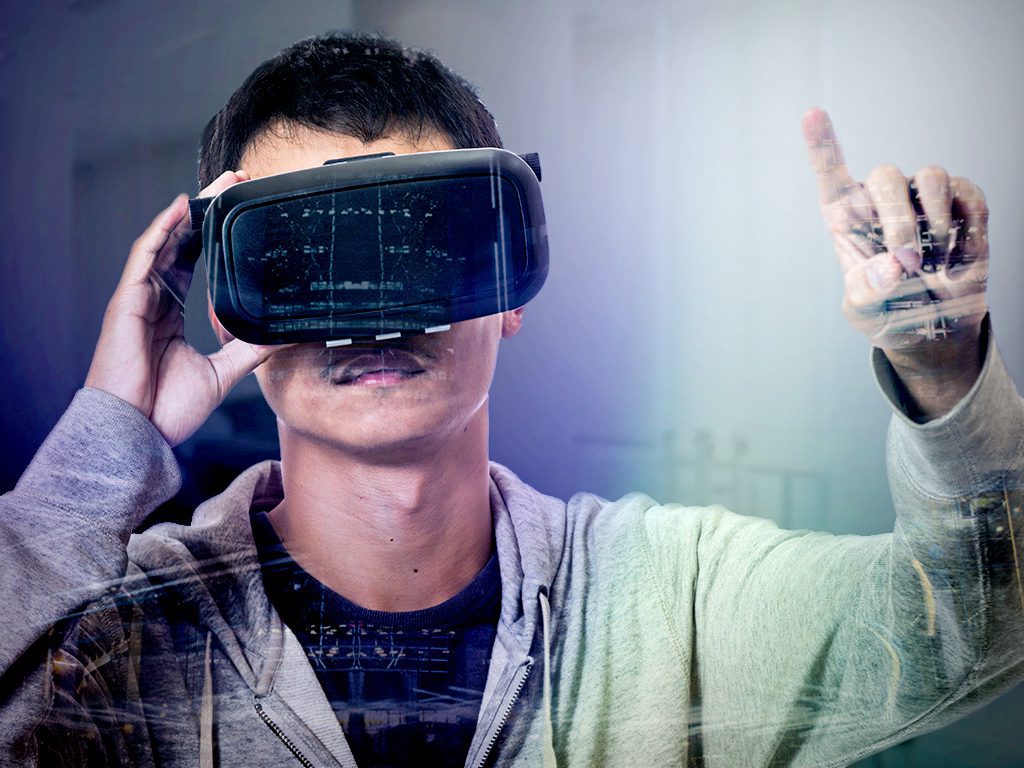Virtual reality (VR) technology is changing the entertainment industry in various ways. Firstly, immersive storytelling through VR allows audiences to fully engage in narratives and virtual worlds. Secondly, the gaming industry is expanding through VR devices that enable players to experience games in fully immersive ways. Thirdly, virtual concerts and events are becoming increasingly popular, making live performances more accessible. Fourthly, VR theme parks are creating virtual environments for guests to experience. Fifthly, VR cinemas and theaters offer unique, fully immersive movie-watching experiences. Sixthly, VR is revolutionizing education and training capabilities for actors, artists, and other creative professionals. Seventhly, VR-based advertising connects with audiences on a deeper level. Eighthly, virtual social networking allows people to connect in fully interactive virtual environments. Ninthly, VR sports enable fans to take part in interactive simulations that replicate the experience of being in the stadium. Lastly, VR fashion shows allow fashion enthusiasts to experience events in fully immersive ways. Overall, the evolving VR technology will continue to transform the entertainment industry, leading to increasingly immersive experiences for audiences.
1. Immersive storytelling
Virtual reality (VR) technologies offer an immersive experience that goes far beyond traditional two-dimensional storytelling methods. In the entertainment industry, VR can be used to create interactive narratives that allow audiences to fully immerse themselves in the story. This experience is transformative, giving viewers the opportunity to become fully immersed in a virtual world.
2. Enhanced gaming experiences
Virtual reality is changing the gaming industry, revolutionizing the way that people interact with games. By using VR gaming devices, players can step into virtual worlds and experience games in a completely immersive way. As a result, players can enjoy a more realistic and immersive gaming experience, which is expanding the market base for the gaming industry.
3. Virtual concerts and live events
The virtual reality technology has opened up new opportunities for live performances in the entertainment industry. With VR, live performances and events can be experienced from the comfort of one’s home. Virtual concerts and shows are becoming increasingly popular, and VR can help reduce the overall cost of production while also giving remote attendees the opportunity to experience live performances.
4. Virtual reality theme parks
Virtual reality is changing every aspect of the entertainment industry, and theme parks are no exception. Advances in VR technology have led to the creation of virtual reality theme parks, where guests can immerse themselves in a variety of virtual environments without leaving the park – providing experiences that go beyond physical attractions and rides.
5. VR-based cinemas and movie theaters
Virtual reality is also changing the way that we watch movies. With VR technology, cinemas and movie theaters are bringing movie watching to a whole new level, providing a fully immersive and unique experience for movie-goers. This can either be in the form of entire VR cinemas or even small VR headsets that can be used to watch movies at home.
6. Virtual reality education and training
Virtual reality has also changed the way we learn and train. Using VR technology, educational institutions can create immersive learning experiences that are more engaging and effective than traditional learning methods. In the entertainment industry, VR can be used to train actors, artists and other creative professionals – creating an invaluable tool for the industry.
7. Virtual reality advertising
Virtual reality advertising brings advertising to a new level. This immersive technology allows advertisers to connect with their audiences in a much more engaging manner. From product commercials that let audiences experience the product, to interactive advertisements that allow viewers to explore virtual experiences – VR advertising is an expanding and exciting new trend in the entertainment industry.
8. VR-based social networking
The internet has changed the way people socialize, and virtual reality technology is taking this to the next level. With VR-based social networking, people can meet and interact with each other in fully interactive virtual environments. This technology allows people to fully immerse themselves in virtual social experiences, making social networking more engaging.
9. Virtual reality sports
Virtual reality sports allow fans to experience sports events in a way that was never before possible. With VR technology fans can experience games live, using interactive simulations that replicate the experience of being in the stadium. Additionally, this technology also allows fans to take part in virtual training exercises and connect with other fans in virtual environments.
10. Virtual reality fashion shows
VR fashion shows allow fashion enthusiasts to watch fashion events in a fully immersive way. These virtual events can be accessed by anyone with compatible VR devices, which allows fashion designers and brands to reach a wider audience. This innovative technology has opened up a new avenue for the fashion industry to showcase new designs and reach new audiences.
In conclusion, it is clear that virtual reality has transformed the entertainment industry, creating new possibilities in every aspect of the industry. Whether it be storytelling, gaming, cinema, education or training – VR technology is revolutionizing how we approach entertainment. As the technology evolves, we can expect to see continued innovation transforming the entertainment industry, providing audiences with increasingly immersive and unforgettable experiences.
